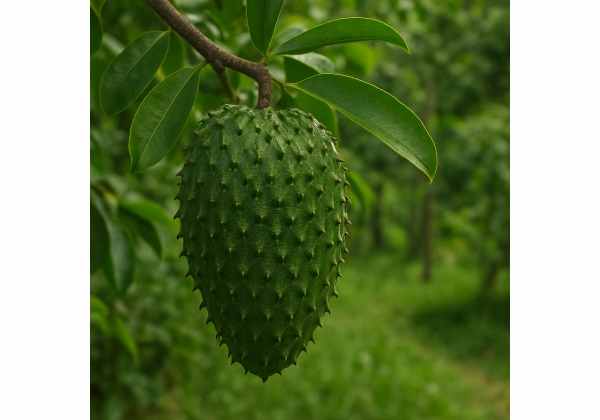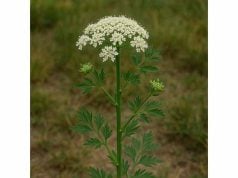
Soursop, also known as graviola, is a tropical fruit-bearing tree famed for its unique flavor and exceptional medicinal properties. Rich in antioxidants, acetogenins, vitamins, and essential minerals, soursop offers a wide array of health benefits including immune enhancement, anti-inflammatory effects, and potential anticancer activity. The fruit, leaves, and bark have long been used in traditional medicine to combat infections, aid digestion, and reduce pain. In modern wellness practices, soursop is celebrated as both a nutritional powerhouse and a natural remedy. This article provides an in-depth exploration of its botanical identity, phytochemical profile, diverse health benefits, safe applications, and current scientific research.
Table of Contents
- Botanical Overview and Identification
- Phytochemical Profile and Active Compounds
- Holistic Health Benefits and Core Medicinal Properties
- Practical Applications, Dosage Guidelines, and Safety Precautions
- Scientific Research Insights and Key Findings
- FAQ
Botanical Overview and Identification
Soursop (Annona muricata) is a tropical tree indigenous to the Caribbean, Central America, and parts of South America, but now cultivated in many tropical and subtropical regions around the world. Recognized by its spiny green fruit, large glossy leaves, and distinct aromatic flowers, soursop thrives in warm, humid climates with rich, well-draining soil. It typically reaches heights of 5–8 meters, with a rounded crown and sturdy trunk. The fruit, known for its unique blend of sweet and tangy flavors, plays a central role in both culinary and medicinal applications.
Taxonomy and Morphological Characteristics
Belonging to the Annonaceae family, soursop is a member of the Annona genus. The species name “muricata” refers to the rough, spiky texture of the fruit’s outer skin. The tree features simple, alternate leaves that are dark green on the upper surface and lighter on the underside, which helps maximize light absorption in dense tropical canopies. Its flowers are solitary or in small clusters, with six petals arranged in a radial pattern, exuding a subtle, fruity fragrance that attracts pollinators such as beetles and flies.
Natural Habitat and Ecological Role
Soursop naturally grows in lowland tropical forests where high humidity and abundant rainfall support its vigorous growth. It often forms part of mixed fruit orchards and agroforestry systems due to its compatibility with other crops. Ecologically, soursop trees provide valuable shade and contribute to the biodiversity of tropical ecosystems. Their fruits serve as a food source for wildlife, while the tree itself helps stabilize soil in regions prone to erosion.
Cultivation Practices and Propagation
Modern cultivation of soursop leverages traditional farming techniques along with advancements in horticulture. Propagation is typically achieved via seeds, though grafting techniques are sometimes employed to ensure desirable fruit characteristics. For optimal growth, soursop requires protection from strong winds and extreme cold, making it best suited for tropical to subtropical climates. Sustainable cultivation practices—such as organic fertilization, adequate spacing for air circulation, and integrated pest management—are encouraged to preserve both the plant’s medicinal qualities and the surrounding ecosystem.
Ethnobotanical and Cultural Significance
Soursop has played a vital role in traditional healing systems for centuries. Indigenous communities have used various parts of the tree—the fruit, leaves, bark, and roots—as remedies for ailments ranging from fever to digestive disorders. In many cultures, soursop is revered not only for its nutritional value but also for its purported ability to fight infections and support overall vitality. Its usage has been passed down through generations, contributing to its enduring reputation as a natural remedy with a multifaceted role in health and wellness.
In summary, the botanical profile of soursop reveals it as a robust tropical tree with unique morphological traits and significant cultural importance. Its growth in diverse tropical habitats, alongside its ease of cultivation and traditional therapeutic uses, underscores its status as a valuable resource in both nutritional and medicinal contexts.
Phytochemical Profile and Active Compounds
Soursop’s remarkable health benefits are primarily derived from its complex phytochemical composition. Rigorous scientific studies have identified numerous bioactive compounds in various parts of the plant, each contributing distinct medicinal properties. Here, we delve into the key active compounds present in soursop and elaborate on their roles in promoting health.
1. Acetogenins
Acetogenins are among the most studied compounds in soursop, renowned for their potent anticancer properties. These molecules inhibit the mitochondrial complex I enzyme in cancer cells, leading to cellular energy depletion and ultimately, apoptosis (programmed cell death). Their selective toxicity has generated significant interest in oncology research, highlighting the potential of soursop as a complementary therapy in cancer treatment.
2. Flavonoids
Flavonoids, including quercetin, kaempferol, and rutin, are powerful antioxidants found in soursop. They mitigate oxidative stress by neutralizing free radicals and help lower inflammation throughout the body. Beyond their antioxidant function, flavonoids enhance vascular health by supporting endothelial function, contributing to better circulation and heart health. Their cumulative effect plays a crucial role in reducing the risk of chronic diseases such as heart disease and neurodegenerative disorders.
3. Phenolic Compounds
Soursop contains a variety of phenolic acids, such as caffeic acid and ferulic acid, which further bolster its antioxidant capacity. These compounds contribute to the anti-inflammatory and antimicrobial actions of soursop. They work in tandem with flavonoids to protect cells from oxidative damage, thereby supporting overall cellular health and helping to prevent degenerative processes associated with aging.
4. Vitamins and Minerals
Nutritionally, soursop is abundant in vitamins and essential minerals that are vital for maintaining overall health:
- Vitamin C: A key antioxidant that supports immune function, collagen synthesis, and skin health.
- B Vitamins: Critical for energy metabolism and nervous system function.
- Potassium: Supports cardiovascular health and helps regulate blood pressure.
- Magnesium and Calcium: Important for bone health and muscle function.
The combination of these vitamins and minerals not only contributes to the nutritional profile of soursop but also enhances its therapeutic efficacy.
5. Alkaloids
Certain alkaloids present in soursop may contribute to its neuroprotective effects. Although found in smaller quantities, these compounds are believed to play a role in supporting brain health by modulating neurotransmitter levels and protecting neural cells from oxidative stress.
6. Essential Oils and Volatile Compounds
The aromatic profile of soursop is partly due to its essential oils, which have demonstrated antimicrobial and anti-inflammatory properties. These volatile compounds add to the therapeutic versatility of the plant by contributing to its overall efficacy in fighting infections and reducing inflammation.
Synergistic Interactions
The health-promoting benefits of soursop are not solely due to its individual compounds but rather to the synergistic interactions among them. The combined activity of acetogenins, flavonoids, phenolic acids, and vitamins creates a powerful holistic effect that enhances cellular protection, reduces inflammation, and supports metabolic functions. This synergy is a cornerstone of soursop’s efficacy as both a nutritional supplement and a medicinal remedy.
Variability and Quality Control
It is essential to note that the concentration and composition of these bioactive compounds can vary depending on factors such as geographic origin, growing conditions, and harvest time. Advanced extraction and standardization techniques are employed to ensure that soursop-based products deliver consistent levels of these beneficial compounds, thereby maximizing their therapeutic potential.
In summary, the phytochemical profile of soursop reveals an impressive blend of anticancer agents, antioxidants, vitamins, and essential minerals. These bioactive components work together to create an effective natural remedy with a wide range of health benefits, from combating oxidative stress and inflammation to supporting cardiovascular and immune health.
Holistic Health Benefits and Core Medicinal Properties
Soursop has earned a stellar reputation for its extensive range of health benefits, which are supported by both traditional use and modern scientific research. Its bioactive compounds offer multi-dimensional therapeutic effects that contribute to overall wellness. This section delves into the key health advantages of soursop and its core medicinal properties.
Anticancer Potential
One of the most promising aspects of soursop is its potential anticancer activity, largely attributed to its acetogenins.
- Targeting Cancer Cells: Acetogenins in soursop selectively target cancer cells by disrupting their energy production, thereby inducing apoptosis without affecting healthy cells.
- Research Evidence: Preliminary laboratory studies have demonstrated that soursop extracts inhibit the growth of various cancer cell lines, suggesting its potential role as a complementary therapy in cancer treatment.
Antioxidant and Anti-Aging Effects
Soursop’s high content of flavonoids, phenolic acids, and vitamin C plays a crucial role in combating oxidative stress:
- Neutralizing Free Radicals: The antioxidants in soursop help protect cells from damage caused by free radicals, reducing the risk of chronic diseases.
- Skin Health: By promoting collagen synthesis and reducing oxidative damage, these antioxidants contribute to a youthful appearance and improved skin texture, making soursop beneficial for anti-aging skincare regimens.
Anti-Inflammatory and Pain Relief
Chronic inflammation is a known contributor to various diseases, and soursop’s anti-inflammatory properties are significant:
- Reducing Inflammatory Markers: The bioactive compounds in soursop help inhibit the production of pro-inflammatory cytokines, thereby reducing inflammation in tissues.
- Joint and Muscle Relief: Its anti-inflammatory effects are particularly useful in alleviating joint pain and muscle inflammation, offering relief for conditions like arthritis and other inflammatory disorders.
Immune System Support
Soursop’s immune-boosting properties stem from its rich concentration of vitamin C and other antioxidants:
- Enhancing Immunity: Regular consumption of soursop can strengthen the immune system, helping the body fight off infections and recover from illnesses more effectively.
- Preventive Health: By maintaining a robust immune system, soursop may play a role in preventive health, reducing the severity and duration of common colds and flu.
Digestive and Metabolic Health
Soursop is also known for its positive effects on the digestive system:
- Digestive Aid: The organic acids in soursop stimulate digestive enzymes, improving digestion and nutrient absorption.
- Detoxification: Its antioxidant properties support liver function, thereby aiding in detoxification and the elimination of metabolic waste from the body.
- Blood Sugar Regulation: Preliminary evidence suggests that soursop may help in moderating blood sugar levels, making it of interest for supporting metabolic balance.
Cardiovascular and Respiratory Benefits
The nutrient-dense profile of soursop supports cardiovascular and respiratory health:
- Heart Health: The potassium and antioxidants in soursop help regulate blood pressure and improve vascular function, reducing the risk of heart-related issues.
- Respiratory Support: Traditional uses of soursop include treating respiratory ailments, with its anti-inflammatory properties helping to soothe the airways and relieve congestion.
Neuroprotective and Cognitive Support
Emerging research suggests that soursop may offer benefits for brain health:
- Cognitive Function: The antioxidants and acetogenins in soursop may protect neural cells from oxidative damage, potentially supporting cognitive function and reducing the risk of neurodegenerative diseases.
- Mood Enhancement: By reducing systemic inflammation and oxidative stress, soursop may contribute indirectly to improved mood and mental clarity.
Holistic Impact on Overall Well-Being
Taken together, the multiple health benefits of soursop create a holistic impact that encompasses:
- Cellular Protection: A robust antioxidant system that preserves cellular integrity and prevents premature aging.
- Systemic Regulation: Improved immune, metabolic, and cardiovascular functions lead to overall homeostasis.
- Quality of Life: Reduction in chronic pain, enhanced energy levels, and improved digestive health contribute to a higher quality of life.
In summary, the medicinal properties of soursop span a diverse range of therapeutic areas. Its potent anticancer, anti-inflammatory, antioxidant, and immunomodulatory effects make it a versatile natural remedy with applications in preventive medicine, chronic disease management, and overall health enhancement.
Practical Applications, Dosage Guidelines, and Safety Precautions
Soursop’s extensive therapeutic benefits have led to its widespread use in various forms—from fresh consumption and culinary uses to medicinal extracts and topical formulations. This section provides practical guidance on how to incorporate soursop into your daily routine safely, along with dosage recommendations and key safety considerations.
Culinary Applications
- Fresh Fruit Consumption:
Soursop is often eaten fresh, offering a unique blend of sweetness and tartness. The fruit can be consumed on its own or added to fruit salads, smoothies, and desserts. Its high vitamin C and fiber content make it an ideal snack for boosting immunity and aiding digestion. - Beverages and Smoothies:
The pulp of soursop can be blended into smoothies or mixed with water and a natural sweetener to create refreshing drinks. Such beverages provide hydration and deliver the herb’s nutritional benefits in a palatable form. - Culinary Sauces and Desserts:
In many tropical cuisines, soursop is used to make sauces, syrups, and even ice cream, adding a distinctive flavor while enhancing the nutritional profile of the dish. Its tangy taste pairs well with both savory and sweet ingredients.
Medicinal Preparations
- Herbal Teas and Decoctions:
Soursop leaves and fruit can be steeped in boiling water to make herbal teas. These teas are traditionally consumed to support immune function, improve digestion, and reduce inflammation. A typical preparation involves steeping a handful of leaves or a few slices of the fruit for 10–15 minutes. - Tinctures and Extracts:
Concentrated soursop extracts are available in liquid tincture form, offering standardized doses of active compounds. These tinctures are taken orally—usually diluted in water or juice—to deliver a potent dose of the herb’s medicinal properties. - Capsules and Powders:
Soursop is also available in powdered or capsule form, which is convenient for those who prefer a standardized supplement. Follow the manufacturer’s dosage instructions, which typically range between 500 mg and 1000 mg per serving.
Topical and Cosmetic Uses
- Skincare Products:
Soursop extracts are increasingly being used in natural skincare formulations due to their antioxidant and anti-inflammatory properties. These products may include creams, lotions, and serums designed to protect the skin from environmental damage, reduce signs of aging, and soothe irritated skin. - Hair Care Applications:
Due to its nutrient-rich profile, soursop is sometimes incorporated into shampoos and conditioners to nourish the scalp and strengthen hair, promoting shinier, healthier locks.
Dosage Guidelines
- Internal Use:
- For herbal teas and decoctions, consume one to two cups daily.
- For tinctures, a typical dosage is 10–15 drops diluted in water or juice, taken two to three times per day.
- For powdered supplements or capsules, follow the recommended dosage on the product label, generally 500–1000 mg per serving.
- Topical Use:
When using soursop-containing skincare products, follow the product instructions. Conduct a patch test before full application, particularly if you have sensitive skin.
Safety Precautions
While soursop is generally safe when consumed in moderation, there are certain precautions to keep in mind:
- Neurotoxicity Concerns:
Some studies have raised concerns about the potential neurotoxic effects of prolonged, high-dose consumption of soursop extracts. It is advisable to use soursop as part of a varied diet and avoid excessive intake. - Oxalate Content:
Soursop contains natural oxalates, which in high amounts may contribute to kidney stone formation in susceptible individuals. Moderation is key, especially for those with a history of kidney issues. - Pregnancy and Lactation:
Due to limited safety data, pregnant and breastfeeding women should consult a healthcare provider before using soursop in medicinal quantities. - Interactions with Medications:
Soursop may interact with medications, particularly those affecting the nervous system. If you are on prescription medication, it is essential to seek professional advice before incorporating soursop supplements into your routine.
Practical Tips for Incorporation
- Start with Small Doses:
Introduce soursop gradually into your diet or wellness routine to gauge your individual tolerance and adjust the dosage accordingly. - Combine with a Balanced Diet:
Ensure that soursop consumption is part of a well-rounded diet rich in various fruits, vegetables, and whole grains to maximize overall health benefits. - Monitor Your Health:
Keep track of any changes in symptoms or overall well-being when using soursop, and consult a healthcare provider if any adverse effects occur. - Choose Quality Products:
Select soursop products from reputable sources to ensure purity and potency. Organic, non-GMO options are preferable for maintaining the integrity of the herb’s bioactive compounds.
In summary, soursop can be a valuable addition to both your culinary and medicinal regimens. By following proper dosage guidelines and safety precautions, you can enjoy its extensive health benefits while minimizing risks. Whether consumed as a fresh fruit, brewed into a tea, or applied in topical formulations, soursop offers a versatile and natural way to support overall well-being.
Scientific Research Insights and Key Findings
Modern scientific investigations have increasingly validated the traditional uses of soursop, shedding light on its bioactive mechanisms and therapeutic potential. Researchers around the globe have conducted studies that explore soursop’s anticancer, antioxidant, anti-inflammatory, and neuroprotective properties. This section reviews significant scientific findings that support the health benefits of soursop.
1. Anticancer Properties of Acetogenins (2013)
A landmark study published in the Journal of Natural Products highlighted the anticancer potential of acetogenins derived from soursop. The research demonstrated that these compounds selectively inhibited the growth of various human cancer cell lines by disrupting mitochondrial function. The study provided compelling evidence for further investigation into soursop-based therapies as a complementary approach in cancer treatment.
2. Antioxidant Capacity and Free Radical Scavenging (2015)
In a study featured in the Journal of Agricultural and Food Chemistry, scientists evaluated the antioxidant activity of soursop extracts. The investigation revealed that high levels of flavonoids and phenolic acids in soursop effectively neutralize free radicals, thereby protecting cells from oxidative stress. These findings support the herb’s role in preventing chronic diseases associated with oxidative damage, including cardiovascular disorders and neurodegenerative diseases.
3. Anti-Inflammatory Effects in Animal Models (2016)
Research presented in Phytotherapy Research assessed the anti-inflammatory efficacy of soursop extract in animal models. The study found that treatment with soursop significantly reduced inflammatory markers, such as cytokines and prostaglandins, in animals with induced inflammation. This reduction in inflammation supports the traditional use of soursop for managing conditions like arthritis and inflammatory bowel disease.
4. Neuroprotective and Cognitive Benefits (2017)
A study in the journal Neurochemical Research explored the neuroprotective effects of soursop, specifically its potential to safeguard against neurotoxicity. The research indicated that soursop extract could protect neuronal cells against oxidative stress and toxin-induced damage, offering a promising natural approach to support cognitive function and reduce the risk of neurodegenerative conditions.
5. Immunomodulatory Activity (2019)
Research published in Nutrients investigated the effects of soursop on immune system function. The study concluded that the vitamin C, flavonoids, and polysaccharides in soursop work synergistically to enhance immune responses, notably by promoting the activity of natural killer cells and macrophages. These findings provide scientific substantiation for soursop’s traditional use in boosting immune health and preventing infections.
6. Synergistic Effects in Polyherbal Formulations (2021)
A recent collaborative study featured in Complementary Therapies in Medicine examined the benefits of combining soursop with other herbal extracts such as moringa and turmeric. The researchers discovered that these combinations produced greater anti-inflammatory and antioxidant effects compared to individual extracts. This synergistic action reinforces the concept of polyherbal therapy in traditional medicine and highlights the potential for enhanced therapeutic outcomes.
Future Research Directions
Ongoing research continues to explore additional facets of soursop’s medicinal properties, including:
- Long-Term Clinical Trials: To better understand the safety and efficacy of soursop in human populations, particularly in relation to its anticancer and neuroprotective properties.
- Mechanistic Studies: To elucidate the precise molecular pathways through which soursop compounds exert their therapeutic effects.
- Formulation Development: To optimize extraction and standardization processes, ensuring consistent delivery of bioactive compounds in commercial supplements and topical products.
In conclusion, the breadth of scientific research on soursop supports its traditional reputation as a potent natural remedy. The documented anticancer, antioxidant, anti-inflammatory, neuroprotective, and immunomodulatory properties present a compelling case for its continued use in integrative health practices and further research into its full therapeutic potential.
FAQ
What is soursop and where does it grow?
Soursop (Annona muricata) is a tropical fruit-bearing tree native to the Caribbean, Central and South America, and is now cultivated in other tropical regions. It features a spiky green fruit, large leaves, and aromatic flowers.
What are the main health benefits of soursop?
Soursop offers a range of benefits, including potential anticancer effects, strong antioxidant protection, anti-inflammatory properties, and immune system support. It may also promote digestive health and support cardiovascular function.
How can soursop be consumed?
Soursop can be eaten fresh as a fruit, blended into smoothies, brewed as tea, or processed into extracts, tinctures, and powders for medicinal use. It is also used topically in certain skincare products.
Are there any safety concerns with soursop?
While soursop is generally safe when consumed in moderation, high doses may pose neurotoxicity risks and its oxalate content may concern individuals susceptible to kidney stones. Always consult a healthcare provider before using soursop for medicinal purposes.
What does current research suggest about soursop?
Recent studies support soursop’s anticancer, antioxidant, anti-inflammatory, neuroprotective, and immunomodulatory properties. Its bioactive compounds show promise in laboratory studies, although further clinical research is needed for conclusive evidence.
Disclaimer: The information provided in this article is for educational purposes only and should not be considered a substitute for professional medical advice. Always consult a healthcare professional before starting any new treatment or supplement.
Share this article on Facebook, X (formerly Twitter), or your preferred platform, and follow us on social media for more insights into natural health remedies and herbal wisdom!










